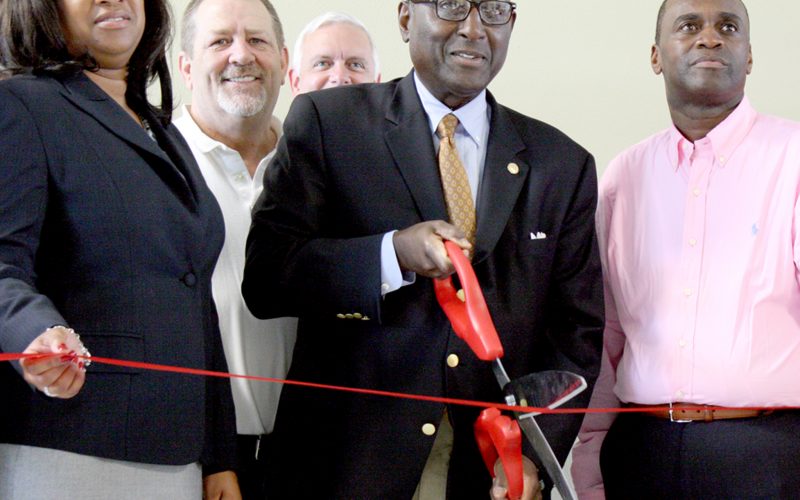
Staff Photo Nick Brothers
Board members of the Urban League of Arkansas celebrate the opening of the Urban League of Arkansas’s first-ever office in Northwest Arkansas.
The National Urban League opened its first-ever chapter in Northwest Arkansas during a ribbon cutting ceremony at the Center for Nonprofits in Springdale, Ark. Friday.
With its re-established presence in Arkansas after two decades, the organization seeks to provide tailored resources and programs in education, economic development, health and wellness and housing to the underserved in the Northwest Arkansas community. While headquartered with its recently re-opened offices in Little Rock, the goal is to open three more satellite offices throughout the state in the future.
The national organization operates through 95 affiliates to assist and empower the lives of 2 million people, according the organization’s website.
“What we do nationally, we’re going to tailor it particularly to the needs of Northwest Arkansas,” said D’Andre Jones, a member of the organization’s board of directors and Northwest Arkansas liaison. “That looks like mentoring, workforce development, focusing on health and wellness and justice.”
In 1995, the Urban League had to close its headquarters in Little Rock due to lack of funding. This summer, the organization has returned to address the new and different challenges the marginalized face in Arkansas.
Historically, the organization was formed by a white woman and a black man in 1910 to address the needs of African Americans in the Great Migration from the south to northern urban cities. The organization is now focused on empowering all who are underserved in the communities it works in, regardless of race.

Staff Photo Nick Brothers
Michael Lyndsey, director of public affairs and government relations at Walmart, presents a giant check for $70,000 to the Arkansas Urban League during the ribbon cutting ceremony Friday.
“The Urban League was born out of a collective awareness for human need,” said Sherman Tate, the chairman of the board of directors for the Arkansas Urban League. “Even today, our board of directors is diverse and will continue to be diverse because this organization — from the very genesis — has been a very diverse organization.”
The organization’s work is just beginning. To get a sense of what Arkansas communities need, the Arkansas Urban League partnered with the University of Arkansas’s Sam M. Walton College of Business to conduct research on the needs of the state’s population. This way, the organization can work from the ground up in each underserved community and establish partnerships to effectively address each region’s challenges.
Throughout Arkansas, 29 percent of children, 20.4 percent of women and 44 percent of single parents live in poverty according to a 2014 survey from spotlightonpoverty.org. Many of these statistics come from the northeast and southeast regions of the state, where poverty is much more common than in Northwest Arkansas.
“I’m from the Arkansas Delta, so I saw first-hand why the need for the Urban League is still so strong,” said Brock Showalter, a member of the advisory board for the Arkansas Urban League. “There’s still so much poverty compared to Northwest Arkansas and it’s two different worlds.”
The organization has already found corporate partnership and support with Walmart and Tyson Foods, the latter which has been working with the Urban League for four years addressing food insecurity in Mississippi.
“Communities need empowerment,” said Jeff Wood, director of community relations at Tyson Foods, at the event. “There is no other organization that does a better job of empowering and rolling out community than the National Urban League.”
Michael Lyndsey, director of public affairs and government relations at Walmart, presented a grant of $70,000 to the Arkansas Urban League during the ribbon cutting ceremony Friday.
Back when the Urban League was active in Little Rock, there wasn’t much going on in Northwest Arkansas. Since then, the area’s population has doubled along with new challenges.

Staff Photo Nick Brothers
The Urban League of Arkansas’s satellite office in Northwest Arkansas is located in the Center for Nonprofits in Springdale, Ark.
Some of the programs and opportunities the Urban League will create could include creating opportunities for felons, helping with housing, job fairs, health fairs and introducing individuals to resources, Jones said. The Urban League will collaborate with other local non-profits and tailor its programs based on what’s needed.
The first order of business will be to hire an executive director and and assistant executive director to oversee operations in Arkansas. As the organization grows they plan to add more jobs and provide internship opportunities, Jones said.
“Our pledge is that we will be responsible,” Tate said. “We won’t let you down. Failure is not an option. This is going to work, but it will only work through our hard effort and your continued support. I know we have to earn that support.”










